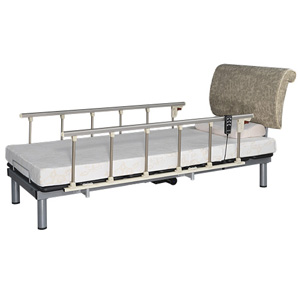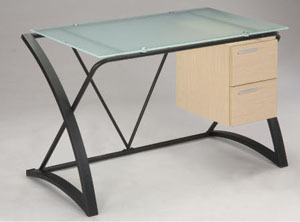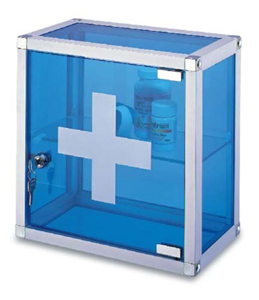Many Metal Furniture Makers in Taiwan Claim to be Recession-proof
Secret to evading global meltdown
2010/06/08 | By Michelle HsuMetal furniture for the first time in 1993 surpassed wooden furniture in annual productivity and has since remained the largest sector of Taiwan's furniture industry. Compared to makers of wooden, rattan and bamboo, or plastic furniture, metal furniture makers perform much better in Taiwan due to sufficient supply of metal materials and, more importantly, Taiwan's superior metal processing and finish techniques.
Few wooden, rattan, or bamboo furniture makers remain in Taiwan due to offshore migration for cheaper labor and material costs. In contrast, plentiful metal supply in Taiwan enables metal furniture makers to stay in business without worrying about material shortage.
But like many other traditional manufacturing industries in Taiwan, metal furniture makers also have to cope with rising labor cost and shortage of willing, capable blue-collar workers. Such labor shortfall drives the makers to build higher value-added items featuring eco-friendliness for example; while demographic trends as graying societies creates new niches, with furniture makers building hospital beds, homecare beds, or other healthcare equipment.
Shortage of Workers
Shortage of blue-collar workers hobble Taiwan's metal furniture makers' operating scale, who are reduced to relatively minor players serving certain niches, producing items as electric hospital beds, school equipment and so on.
Such scenario is a blessing in disguise: being small has the advantage of being more immune to the global meltdown, with wide spread sagging demand not undermining steady growth of certain small furniture makers.
Moreover, most of Taiwan's metal furniture makers expect little impact from the signing of the Cooperation Framework Agreement (ECFA) between Taiwan and China that should boost mutual trade; but some scholars worry further opening Taiwan's market to China-made industrial parts would shatter Taiwan's traditional manufacturing.
Metal furniture makers don't expect to be impacted by ECFA for they mostly use domestically-supplied materials to supply tiny niches that would not interest larger China-based furniture makers.
Green-savvy Buyers
Ho Shuan Enterprise, for example, started bidding for U.S. government tenders for furniture a couple of years ago, and has won several such projects. "We see fewer competitors in this new niche," said general manager Wayne Weng, adding that larger furniture makers simply are not interested in these small projects.
A great advantage to official procurement is much higher profit margin for government agencies are willing to pay for higher quality. "They are more quality than price conscious," Weng said. The U.S. government has been prioritizing eco- protection in procurements. "There are the so-called cradle-to-cradle projects where products can be fully recycled to make more products," Weng explained. "There is even an official project requiring us to use an Arabian-firm developed eco-friendly plastic that is fully recyclable despite being triple the price of typical recyclable plastics," Weng said.
Ho Shuan is an OEM making furniture based on buyer-provided drawings and requirements. "The government agencies indeed have much higher specifications than typical consumers, and we can win such public sector projects mainly for our metal furniture making expertise and experience," said Weng.
Ho Shuan, established in 1986, operates a metal furniture factory in Taiwan and a wooden furniture production line in China, moved there due to shortage of wooden material supply in Taiwan.
"We never worry about metal supply in Taiwan for several large steel-making companies are here," said Weng. However, Weng noted, rising material costs will be reflected in metal furniture prices sooner or later since steel prices have been rising without sign abatement.
Ho Shuan suffered little from the global meltdown: "Because we work with small buyers whose orders are small, steady and unaffected by the general economy," Weng said.
More importantly, most of them are seeking OEM partners. "Such buyers value quality over price," said Weng, adding that the firm never worries about losing buyers to China-based counterparts for "they only place small orders that would not interest bigger operators in China."
After setting up a wooden furniture factory in southern China for lower labor cost, Ho Shuan, however, has struggled with labor shortage for several years. "We assumed that we could easily tap the plentiful labor force in southern China where many migrants came from the inland to work; but rising affluence inland has undermined our potential labor pool; while labor shortage along the coastal area may last a while as well as pushing up labor cost in China-made furniture," Weng observed.


Healthcare Niche
Green May Industrial, originally a specialized auto parts manufacturer, started to produce electric metal beds 12 years ago. "We used to be a subcontractor for Japanese automakers," said R&D manager Kelvin Yu. "Having Japan as our major market saw us visit that country frequently and we saw the vast graying society and niche for healthcare services, so it was only logical for Green May Industrial to tap the market by making electric metal beds. It turned out to be a right, farsighted decision 12 years ago."
Tapping its own experience in auto parts making enabled Green May Industrial to easily diversify into electric hospital beds, and later beds for homecare. "Many Japanese people buy electric metal beds for homecare of seniors, where such beds were only available to hospitals," said Yu.
Electric metal beds make life easier for elderly people, with motorized action that enables easier getting up and lying semi-upright. "Well-engineered electric mechanism is critical to ensure smooth operation," Yu said.
Rising Demand
Yu also says that demand has been rising, with sales increasing sizably five years ago from 10 years ago. And this niche seems recession-proof, fueled by necessity resulting from the Japanese graying society that props up steady demand.

These beds are even gender-oriented: made of lightweight materials to allow easier operation by Japanese women who are generally responsible for caring for the aged. Also the beds are compact to fit into often tiny apartments in Japan.
"Many Japanese live in modest apartments, so some users fold the beds during the day to maximize living space; while some models have casters for easy portability," said Yu.
Green May Industrial is eyeing other profitable healthcare product niches targeting seniors based on its success.
Patented Design
Zona Development, another metal furniture maker in Taiwan, creates added-value by developing patented products. The aluminum-framed cabinet with four glass panels allowing opening from any side, for example, is patented for structure.
"Despite its minor innovation, this cabinet creates major convenience for easy opening from any of the four sides. Moreover, the innovative design makes the cabinets ideal as a display cabinet," said general manager Michael Wu.
A metal furniture maker, Zona Development prefers aluminum alloy which has the advantage of being easy to custom finish. Moreover, aluminum is more malleable, so can be easily shaped.
Wu also expects not to be impacted by the ECFA (Economic Cooperation Framework Agreement), which some say may hurt Taiwan's traditional manufacturing when the market is further opened to China-made products. Taiwan's metal finishing skills are much higher, an edge that keeps makers ahead of international rivals, with such merit keeping Taiwan's furniture makers alive and well.
Established in 1986, Zona Development currently focuses on the American and European markets, and has no plans to tap the China market where, according to Wu, the furniture market is robust enough to support domestic suppliers, leaving little room for outsiders.




